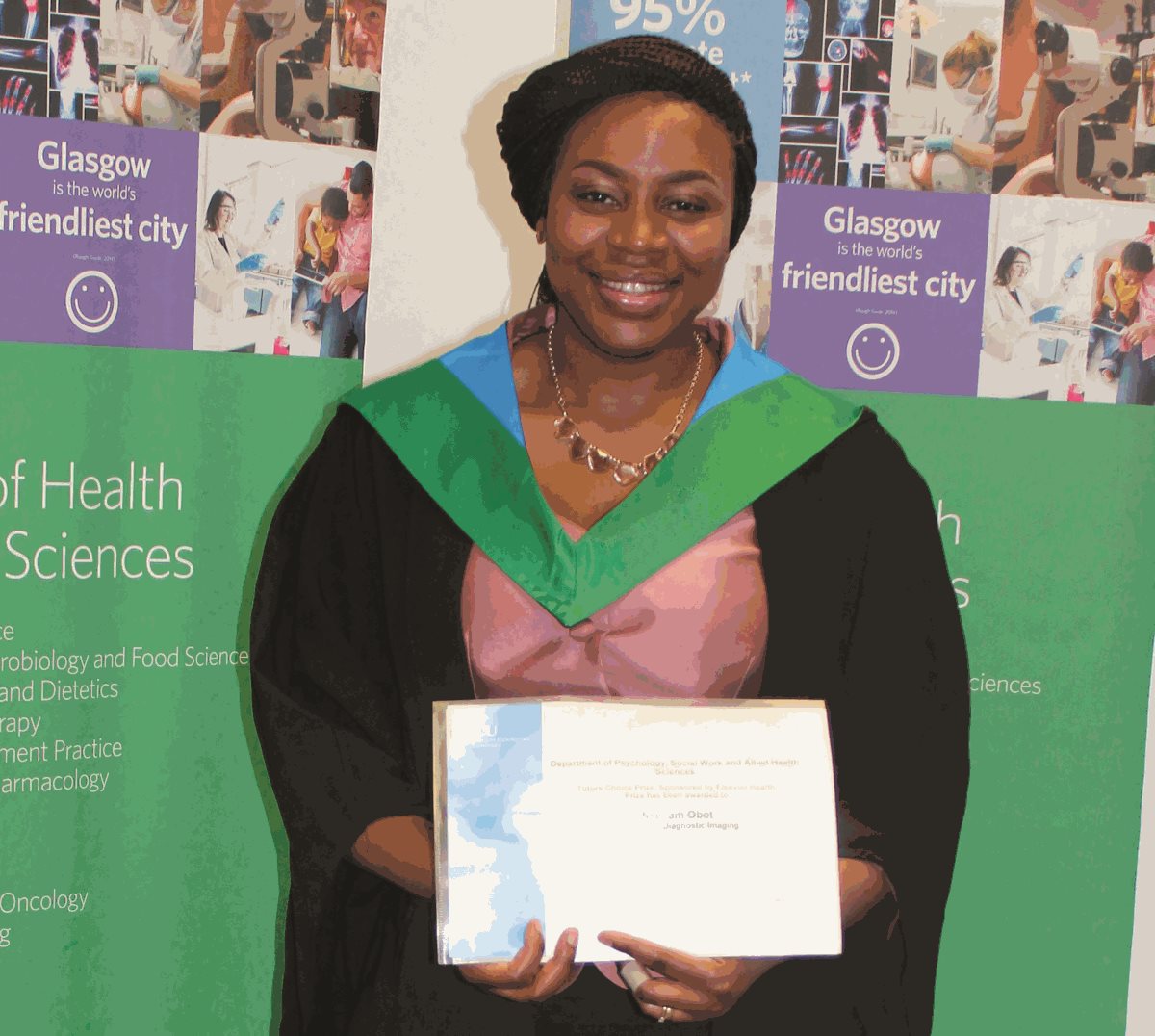A newly qualified radiographer has won the second Scottish Health and Social Care Team Challenge (SHSCTC), a competition designed to educate Scotland’s next generation of health and social care professionals in collaborative, person-centred care.
Nsenam Obot, who studied at Glasgow Caledonian University and is now working at Queen Elizabeth University Hospital in Glasgow, took part in the challenge during her final year.
The only diagnostic radiography student in the competition, Nsenam worked as part of a team that included students of occupational therapy, medicine, nursing and speech and language therapy.
The team designed and presented a care plan based on a real-life patient case study.
Delivered under timed conditions, the team’s winning plan was one of four presented to a large audience and panel of expert judges, which included officials from the Scottish Government, as well as the patient’s mother/carer.
Nsenam explains: “This year’s SHSCT focused on a 30-year-old lady with profound and multiple learning disabilities who suddenly took ill and was to be admitted into acute care.
"We had to provide a care management plan for the patient while in care and beyond discharge.
"As it was based on a real patient, we had a strong sense of commitment and accountability as a team.
“We began by identifying the clinical priorities, both as individual health and care professionals and as a team.
"The patient had a number of complex health conditions and needs which included cerebral palsy, epilepsy, end stage respiratory failure, non-verbal communication and jejunustomic nutrition.
“She had been primarily cared for by her parents from birth, therefore our care plan placed emphasis on ensuring her care was not only patient-centred, but also that her parents were an important part of the care team and decisionmaking processes.
"We also focused on ensuring that she continued to have the best possible quality of life upon discharge from acute care.”
The teams were also asked to respond to a range of extended questions based on complications and challenges that could further arise concerning the patient.
Nsenam continues: “This part of the challenge was aimed at testing the participants’ abilities to make timely clinical decisions, as well as collaborate under pressure as a team to produce solutions for the benefit of the patient.”
Nsenam says that as a diagnostic radiography student she brought a vital perspective to the challenge: “There was some level of blurring around issues of consent arising from the fact that patient’s carers were also her parents and in this case, she was beyond the age of parental consent.
“The SCoR’s documents on consent for adults with impaired capacity, consent to imaging and radiotherapy treatments and IR(ME)R Amendment Regulations were my best friends at this time!
"This is a complex area, and it is important to note there are subtle differences in UK legislation.
“Justifying radiographic procedures other members of the team thought would be beneficial for the patient was also a challenge. I had to bear in mind the needs of the patient and the extent of interventions I would consider ethical.
"Again the SCoR’s guidelines, and my own professional judgement, were all there to keep me right.”
Delighted that her team won this year’s SHSCTC, Nsenam says there have been many benefits for her as a radiographer: “My level of patient care, communication and confidence, especially when dealing with patients with learning disabilities, experienced a significant boost.
“It also re-emphasised to me the difference it can make to my patient when I ensure that the care that I offer them is person-centred and ethical. With evidence-based practice being a major expectation in contemporary healthcare, the competition gave me an opportunity to consider what person-centred care really entails from a radiographer’s perspective.
“I realised at this point that the little things such as really seeing the ‘person in the patient’ should not be ignored. In addition to the knowledge and skills I’ve gained from studying at GCU, I consider autonomy, professional judgement and team working to be major essentials of being a radiographer.
"I’m pleased to say the competition provided me with the opportunity to hone all three attributes.”
Nsenam says she was proud to be the only diagnostic imaging student taking part to date, but would like to see the profession better represented in future competitions.
Sharon Stewart, lecturer & practice educator co-ordinator at Glasgow Caledonian University, commented: “We are very proud that Nsenam took part and eventually won with her team in what was an exciting and challenging event.
"I would encourage other radiography students in Scotland to consider getting involved in the future, as Nsenam notes it has helped her hone many key skills.”
